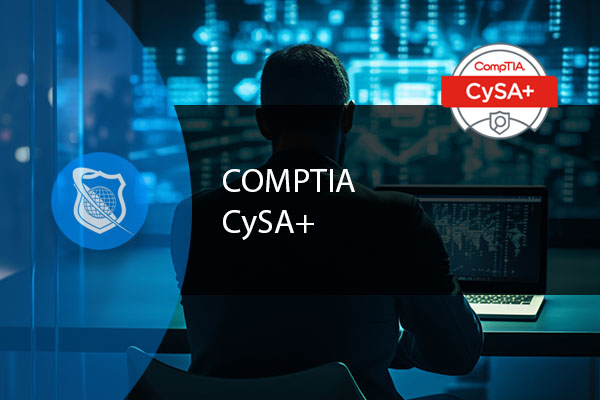What Is Minimum Viable Product?
Definition: Minimum Viable ProductA Minimum Viable Product (MVP) is a development strategy used to build new products with enough features to attract early adopter customers and validate a product idea

The CompTIA Security+ certification emerges as a critical milestone for IT professionals aiming to fortify their careers. But is it the right choice for you in 2024? This guide explores the benefits, costs, and comparative value of this globally recognized certification, guiding you through making an informed decision for your cybersecurity career path.
CompTIA Security+ is a globally recognized certification that validates the baseline skills necessary to perform core security functions and pursue an IT security career. As a vendor-neutral credential, it covers essential principles for network security and risk management, making it an ideal choice for IT professionals looking to expand their cybersecurity knowledge and skills.
The CompTIA Security+ Certification is highly regarded in the IT industry, specifically designed to certify a professional’s knowledge and skills in cybersecurity. Here’s a detailed overview of the CompTIA Security+ Certification:
Our robust CompTIA Sec+ course is the perfect resouce to ensure your company’s most valuable assets are safe. Up your security skills with this comprehensive course at an exceptional price.

Propel your career forward and be part of an essential member of any management team as an Information Security Manager. This advanced training series is designed specifically for those want to move up into a management position in the IT field.
Pursuing CompTIA Security+ in 2024 aligns you with the industry’s evolving cybersecurity standards. It’s not just about understanding security fundamentals; it’s about being prepared for the future’s cybersecurity challenges. From mastering the latest in security technologies to risk management principles, the certification broadens your knowledge spectrum, making you an invaluable asset to any IT security team.
Investing in the CompTIA Security+ certification requires time and financial resources. The exam fee, along with study materials and potential training courses, can add up. However, the return on investment is substantial. Certified professionals often enjoy better job prospects, higher salaries, and increased credibility in the industry, making this certification a smart investment for your future.
Holding a CompTIA Security+ certification opens the door to various roles in the cybersecurity sector. Security Analyst, Security Engineer, and IT Auditor are just a few positions where this certification is highly valued. In a field where credentials are crucial, having Security+ on your resume distinguishes you in the job market.
Success in the CompTIA Security+ exam requires a comprehensive study plan. Utilize a combination of study materials like books, online courses, and practice exams. Participating in online forums and study groups can provide valuable insights and support. For those new to cybersecurity, a more extended preparation period may be necessary to fully grasp the concepts.

Ready to fortify digital landscapes? Unleash your potential with our CySA+ course. Master behavioral analytics, shield networks, and become a certified defender against cyber threats. Elevate your security prowess, ace the CompTIA CySA+ (CS0-003) exam, and secure a resilient future for organizations
The skills gained from the CompTIA Security+ certification are not just theoretical; they play a crucial role in real-world cybersecurity scenarios. From identifying and mitigating security threats to implementing robust security measures, these practical skills are essential for any IT professional aiming to safeguard digital environments.
The CompTIA Security+ certification endows professionals with a plethora of skills that are highly applicable and valuable in real-world cybersecurity environments. Below are key areas where the skills and knowledge gained from the Security+ certification can be effectively applied:
Security Threats Identification and Response
Security Technologies and Tools
Security Architecture and Design
Identity and Access Management
Risk Management Practices
Cryptography and PKI
Incident Response and Recovery
Compliance and Regulatory Understanding
Security in Diverse Environments
Advanced Security Concepts
Collaboration and Communication
Continuous Learning and Professional Development
The CompTIA Security+ certification prepares professionals not only with the technical knowledge necessary for securing information systems but also instills a proactive approach towards identifying and mitigating security threats. These skills are indispensable for navigating the challenges of the modern cybersecurity landscape.
Our robust CompTIA Sec+ course is the perfect resouce to ensure your company’s most valuable assets are safe. Up your security skills with this comprehensive course at an exceptional price.
To maintain the CompTIA Security+ certification, professionals must participate in the Continuing Education (CE) program or retake the exam every three years. This ongoing learning commitment ensures that certified individuals remain at the forefront of cybersecurity practices and technologies, making them perpetually valuable assets in a dynamic field.
Deciding whether CompTIA Security+ is right for you hinges on your career aspirations and professional development goals. If you aim to build a strong foundation in cybersecurity and aspire to contribute significantly to the security posture of your organization, this certification represents a critical step forward in your career.
Understanding the key terms related to the CompTIA Security+ certification is crucial for individuals considering this qualification in the field of cybersecurity in 2024. This certification is widely recognized in the IT industry, focusing on a broad range of cybersecurity topics. It prepares candidates for cybersecurity roles by ensuring they have the necessary skills to perform core security functions. Knowing these terms not only aids in grasping the certification’s value but also in understanding the foundational concepts in cybersecurity that the certification covers.
| Term | Definition |
|---|---|
| CompTIA Security+ | An entry-level global certification that validates the baseline skills necessary to perform core security functions and pursue an IT security career. |
| Cybersecurity | The practice of protecting systems, networks, and programs from digital attacks. |
| Network Security | Measures taken to protect a computer network against unauthorized access or attacks. |
| Threat Intelligence | Analysis and collection of information about current and potential attacks that threaten the safety of an organization or its assets. |
| Cryptography | The practice and study of techniques for secure communication in the presence of third parties called adversaries. |
| Risk Management | The process of identifying, assessing, and controlling threats to an organization’s capital and earnings. |
| Incident Response | A method by which an organization handles a data breach or cyberattack, including the way the organization attempts to manage the consequences of the attack or breach. |
| Compliance | Ensuring that an organization follows relevant laws, regulations, guidelines, and specifications. |
| Identity and Access Management (IAM) | The framework of policies and technologies ensuring that the right users have the appropriate access to technology resources. |
| Vulnerability Assessment | The process of identifying, quantifying, and prioritizing (or ranking) the vulnerabilities in a system. |
| Penetration Testing | A simulated cyber attack against your computer system to check for exploitable vulnerabilities. |
| Security Controls | Safeguards or countermeasures to avoid, detect, counteract, or minimize security risks to physical property, information, computer systems, or other assets. |
| Malware Analysis | The process of understanding the functionality, origin, and potential impact of a given malware sample, such as a virus, worm, or Trojan horse. |
| Firewall | A network security device that monitors incoming and outgoing network traffic and permits or blocks data packets based on a set of security rules. |
| Intrusion Detection System (IDS) | A device or software application that monitors a network or systems for malicious activity or policy violations. |
| Virtual Private Network (VPN) | A service that allows you to connect to the Internet via a server run by a VPN provider, encrypting your data and hiding your IP address. |
| Secure Sockets Layer (SSL) | A standard security technology for establishing an encrypted link between a server and a client—typically a web server (website) and a browser, or a mail server and a mail client. |
| Public Key Infrastructure (PKI) | A set of roles, policies, and procedures needed to create, manage, distribute, use, store, and revoke digital certificates and manage public-key encryption. |
| Security Information and Event Management (SIEM) | Software solutions that aggregate and analyze activity from many different resources across your entire IT infrastructure to identify potential security threats. |
| Data Breach | A security incident in which information is accessed without authorization. |
| Cybersecurity Framework | A set of policies and procedures for managing and mitigating cybersecurity risk designed by organizations or government agencies. |
These terms form the backbone of the knowledge required to understand the scope and value of the CompTIA Security+ certification, especially considering its relevance in 2024.
The CompTIA Security+ certification provides comprehensive training in identifying, analyzing, and responding to cybersecurity threats and vulnerabilities. It teaches professionals about the latest security protocols, risk management strategies, and mitigation techniques, ensuring they have the practical skills to protect organizations against a wide array of security challenges.
Yes, the CompTIA Security+ certification is valuable for non-technical professionals who work in environments where understanding cybersecurity principles is crucial. This includes roles in management, sales, and policy-making within IT and cybersecurity firms, where a foundational knowledge of security concepts can greatly enhance decision-making and strategic planning.
While CompTIA Security+ is an excellent starting point and is sufficient for entry-level cybersecurity roles, advancing in the field often requires additional certifications. Specialized certifications such as CompTIA Cybersecurity Analyst (CySA+), CompTIA Advanced Security Practitioner (CASP+), or certifications from other organizations can be necessary for higher-level positions.
The CompTIA Security+ curriculum is regularly updated to reflect the latest cybersecurity trends, technologies, and best practices. This ensures that certified professionals are equipped with up-to-date knowledge and skills relevant to the current cybersecurity challenges and the evolving threat landscape.
CompTIA Security+ covers key aspects of regulatory compliance and industry standards, providing professionals with the knowledge needed to ensure that security policies and procedures meet regulatory requirements. Understanding these principles is critical for implementing effective security measures that comply with laws and regulations, such as GDPR, HIPAA, and SOX.
Lorem ipsum dolor sit amet, consectetur adipiscing elit. Ut elit tellus, luctus nec ullamcorper mattis, pulvinar dapibus leo.
$49.99 Original price was: $49.99.$16.99Current price is: $16.99. / month with a 10-day free trial
Definition: Minimum Viable ProductA Minimum Viable Product (MVP) is a development strategy used to build new products with enough features to attract early adopter customers and validate a product idea
Definition: Graphic EqualizerA Graphic Equalizer is a sound processing device or software feature that allows users to adjust the balance between frequency components of an audio signal. It consists of
Definition: Wi-Fi Range ExtenderA Wi-Fi range extender, also known as a Wi-Fi repeater or Wi-Fi booster, is a type of network device that is used to extend the coverage area
Definition: Python SeabornPython Seaborn is a data visualization library built on top of Matplotlib that offers a high-level interface for drawing attractive and informative statistical graphics. It is designed to
Definition: VPN ConcentratorA VPN concentrator is a type of networking device that provides secure and encrypted connections for remote clients to a corporate or organizational network over the Internet. It
Definition: Virtual WorkspaceA virtual workspace is a technology-enabled environment that allows individuals and teams to collaborate, communicate, and work together remotely. This workspace utilizes a range of software tools and
Definition: Digital TwinsA digital twin is a virtual model designed to accurately reflect a physical object. These digital replicas are used for running simulations, predicting future conditions, and troubleshooting potential
Elasticsearch is a distributed, RESTful search and analytics engine capable of addressing a growing number of use cases. As the heart of the Elastic Stack, it centrally stores your data
Git is a distributed version control system that is widely used in software development to track changes in source code during the development process. It is designed for coordinating work
Definition: Kernel Space DriverA Kernel Space Driver is a type of software that operates in kernel space, which is the most privileged operating area of the operating system. These drivers
Definition: FAT FilesystemThe FAT (File Allocation Table) filesystem is a simple and widely used file system architecture developed by Microsoft. It organizes and manages files on storage devices, such as
Definition: GeofencingGeofencing is a location-based service that creates a virtual geographic boundary around a specified area, using technologies such as GPS, RFID, Wi-Fi, or cellular data. When a mobile device
ENDING THIS WEEKEND: Train for LIFE at our lowest price. Buy once and never have to pay for IT Training Again.

Get ready for the updated 220-1201 & 220-1202 exams with our brand-new CompTIA A+ training—designed to help you pass with confidence and start your IT career strong. Access this course and over 2,900 hours of expert-led IT training when you sign up for any of our All-Access Passes. Don’t miss out—enroll now and start learning today!